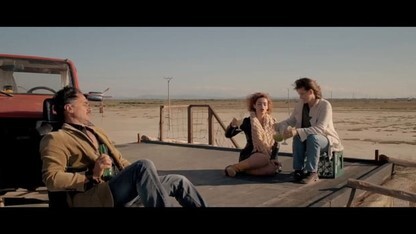
An Albanian movie director who studied film at the University of Nebraska-Lincoln received Oscar consideration for her first feature film.
Although it was not selected as a finalist, “Bota,” by Iris Elezi, was among 80 semifinal candidates for an Academy Award for Best Foreign Language Film. Elezi, who attended UNL from 1995 to 1998, co-wrote the screenplay and co-directed the movie with her husband, Albanian-American filmmaker Thomas Logoreci.
Elezi’s film previously collected 13 awards in film festivals internationally. It won a European and Mediterranean film critics award at the Karlovy Vary International Film Festival in the Czech Republic and an international film critics award at the Reykjavik film festival. It was honored as best feature at the Balkan Film Festival in Pogradec, Albania.
“Bota” was selected by the Albanian Culture Ministry as its candidate for the Oscar. It did not make the nine-film shortlist announced in mid-December by the Academy of Motion Picture Arts and Sciences, but continues to enjoy international recognition. It is among 40 selected for screening at the Palm Springs International Film Festival later this month. Set in Albania’s isolated marshlands, “Bota” – Albanian for “the world” – tells the story of people who run a small café in an area once used as a penal camp under the rule of dictator Enver Hoxha. Hoxha was known for imprisoning and executing political opponents and exiling their families to remote villages, where they were watched by secret police.
Elezi now lives and works in the Albanian capital of Tirana, where she teaches film history. During her time at UNL, she studied with professors Wheeler Winston Dixon and Gwendolyn Audrey Foster. In an email to Dixon and Foster, Elezi thanked both for their guidance.
“This is a real accomplishment for Iris,” Dixon said. “Years of hard work, and it’s paid off. We’re really happy for her success.”
In addition to describing Dixon and Foster’s influence as instrumental, Elezi also credited her years in Nebraska’s unique vast spaces as a visual inspiration for the film’s Albanian Western-like atmosphere.
Elezi said she frequently turned to Foster and Dixon’s textbook, “A Short History of Film,” during the past five years as she made lesson plans for her students in Tirana.
“I am incredibly thrilled to hear of Iris’s success, but I can’t say I am entirely surprised,” Foster said. “She was an outstanding student in my Screenwriting and Women Film Directors classes, and told me they had a direct impact on her ability to envision her own future as a writer and director.”
After she completed graduate work in New York, Elezi traveled in the Balkans and eastern Europe, making a multi-part documentary about the region and its history.
The documentary, titled “Under Construction,” inspired her to begin writing a screenplay based on the lives of men and women who had been interned during a half-century of communist rule in Albania.
“What happens if, in a small community, where only forty families live, there is a construction of a new highway – but this is a place where history still reigns and the weight is still heavy on these people’s shoulders?” she said in an interview with Cineuropa. “These were some of the inquiries I was trying to discuss in this film.”
Elezi and Logoreci met while she was developing the movie’s script. They married in 2010. When they moved in together, they discovered they had a common influence in Foster and Dixon’s work.
“As we put our books together on the shelf in our little house, we realized we each had our own copy of Wheeler’s ‘The Films of Jean-Luc Godard,’” Elezi said in her email. “I think this was a good sign.”









